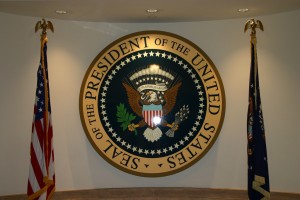When Will The 2016 GOP Candidates Discuss Education?

As the large group of Republican presidential hopefuls fight for the White House, the topic of education rarely comes up during their debates. (Photo Credit: Stephen Mellentine/Flickr)
The 2016 Republican presidential candidates squared off in another debate this week, with attacks on one another and more back and forth on issues of foreign policy and diplomacy dominating the conversation.
As with the first debate last month, little of the discussion circled back to education, despite many of the candidates’ extensive experience with school policy in their home states.
The moderators didn’t ask the candidates any direct questions regarding education, but there were a few occasions when the presidential hopefuls mentioned, only briefly, some education policy issues.
Education Week highlights all of these occurrences, some of which are listed below:
• Front-runner Donald Trump was the only candidate to directly bring up the Common Core State Standards, which was the K-12 policy star of the GOP debate last month. But Trump only touched on it in passing—in an exchange with former Florida Gov. Jeb Bush, Trump mentioned Bush’s support for the common core, and added, “which is also a disaster.” (That’s a reprise of a previous Trump attack on Bush from June.) Bush did not respond, however.
• Bush did bring up one of his signature accomplishments while running Florida: his approval of a major school choice program. He highlighted the state’s tax-credit scholarship program as “the largest voucher program in the country.” (The scholarships in the program Bush referred to aren’t strictly vouchers.)
• Discussing a question about the minimum wage, Wisconsin Gov. Scott Walker argued that creating a good education system was a superior approach to helping the economy than raising the minimum wage. For a picture of Walker’s K-12 record, and how he talks about it, click here. Walker also mentioned the “big government union bosses” who opposed him in Wisconsin, a reference in part to teachers’ unions who opposed his successful push to effectively end collective bargaining for most public employees.
In terms of big issues, the candidates mostly focused on foreign policy and economic issues, which might be the norm for this election. These issues currently dominate the agenda in Washington, and according to a Gallup poll conducted before the 2014 midterm election, these are the issues voters find most important.
But if education ever does take center stage, the likely hot topics will be federally mandated standards, the rising cost of college and support for school vouchers.
The cost of college is something the Obama administration has addressed, especially in Indiana. President Obama visited Ivy Tech Community College in Indianapolis earlier this year to discuss his plan for making community college free and Secretary of Education Arne Duncan discussed the cost of college and barriers to graduating this week at Purdue.
With the conversation started by the current administration it might only be a matter of time before the Republicans share their views.